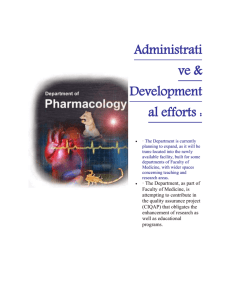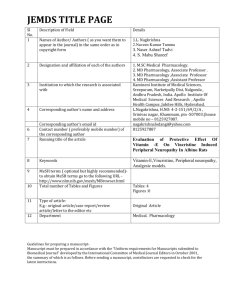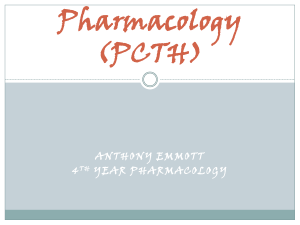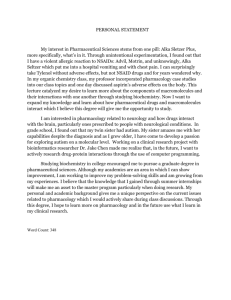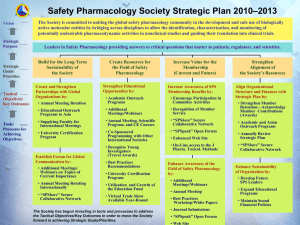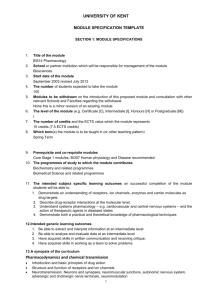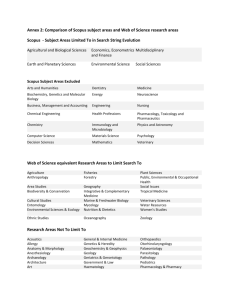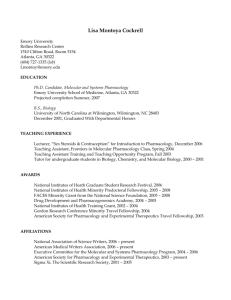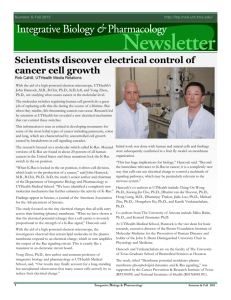Statement Example #1 - Undergraduate Research
advertisement
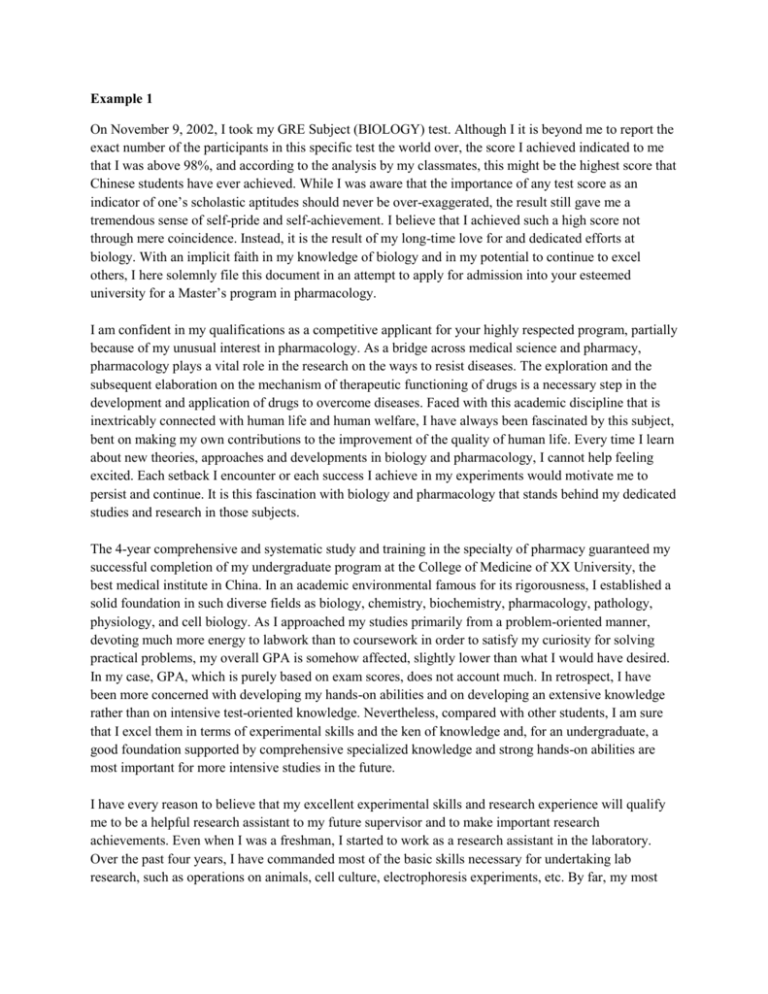
Example 1 On November 9, 2002, I took my GRE Subject (BIOLOGY) test. Although I it is beyond me to report the exact number of the participants in this specific test the world over, the score I achieved indicated to me that I was above 98%, and according to the analysis by my classmates, this might be the highest score that Chinese students have ever achieved. While I was aware that the importance of any test score as an indicator of one’s scholastic aptitudes should never be over-exaggerated, the result still gave me a tremendous sense of self-pride and self-achievement. I believe that I achieved such a high score not through mere coincidence. Instead, it is the result of my long-time love for and dedicated efforts at biology. With an implicit faith in my knowledge of biology and in my potential to continue to excel others, I here solemnly file this document in an attempt to apply for admission into your esteemed university for a Master’s program in pharmacology. I am confident in my qualifications as a competitive applicant for your highly respected program, partially because of my unusual interest in pharmacology. As a bridge across medical science and pharmacy, pharmacology plays a vital role in the research on the ways to resist diseases. The exploration and the subsequent elaboration on the mechanism of therapeutic functioning of drugs is a necessary step in the development and application of drugs to overcome diseases. Faced with this academic discipline that is inextricably connected with human life and human welfare, I have always been fascinated by this subject, bent on making my own contributions to the improvement of the quality of human life. Every time I learn about new theories, approaches and developments in biology and pharmacology, I cannot help feeling excited. Each setback I encounter or each success I achieve in my experiments would motivate me to persist and continue. It is this fascination with biology and pharmacology that stands behind my dedicated studies and research in those subjects. The 4-year comprehensive and systematic study and training in the specialty of pharmacy guaranteed my successful completion of my undergraduate program at the College of Medicine of XX University, the best medical institute in China. In an academic environmental famous for its rigorousness, I established a solid foundation in such diverse fields as biology, chemistry, biochemistry, pharmacology, pathology, physiology, and cell biology. As I approached my studies primarily from a problem-oriented manner, devoting much more energy to labwork than to coursework in order to satisfy my curiosity for solving practical problems, my overall GPA is somehow affected, slightly lower than what I would have desired. In my case, GPA, which is purely based on exam scores, does not account much. In retrospect, I have been more concerned with developing my hands-on abilities and on developing an extensive knowledge rather than on intensive test-oriented knowledge. Nevertheless, compared with other students, I am sure that I excel them in terms of experimental skills and the ken of knowledge and, for an undergraduate, a good foundation supported by comprehensive specialized knowledge and strong hands-on abilities are most important for more intensive studies in the future. I have every reason to believe that my excellent experimental skills and research experience will qualify me to be a helpful research assistant to my future supervisor and to make important research achievements. Even when I was a freshman, I started to work as a research assistant in the laboratory. Over the past four years, I have commanded most of the basic skills necessary for undertaking lab research, such as operations on animals, cell culture, electrophoresis experiments, etc. By far, my most important research experience came from undertaking my graduation project, which exemplified an overall test of experimental techniques. I chose to focus on the Effect of Ye3 on the Cell Apoptosis. The reason for choosing this subject of research is that the study of cell apoptosis has a crucial importance in the treatment of cancer and in maintaining the immunity of those suffering from AIDS. On the premise that rare earth ions are considered capable of entering cells, I decided that my project would concentrate on rare earth ions and their effects on cell nucleus. With extensive experiments, I discovered that, under different circumstances, rare earth ions would produce totally different behavior toward cell apoptosis. When the concentration of rare earth ions is below a certain ultimate limit, the function of the ions changes from that of facilitating cell apoptosis to that of suppressing cell apoptosis. As an initial and tentative study, my research has won very positive comments from my advisor. In undertaking a large quantity of experiments, I not only applied basic operation skills with much dexterity but also acquired many new techniques such as making post-coloring observation of the morphology of cell nucleus through the confocal fluorescence microscope, and performing qualitative testing of cell apoptosis with the help of flow cytometry method (FCM). Having completed my undergraduate education and acquired necessary qualifications, I would like to pursue a more advanced degree program at The Department of Pharmacology & Therapeutics, Faculty of Medicine at The University of XX. The department, founded in the 1950’s, has been greatly strengthened by the joining of dozens of renowned scholars and specialists over each of the past decade. Its mission, “to educate, create and sustain knowledge concerning the actions and mechanisms of drugs in biology and medicine," reflects the Department’s consistent dedication to academic excellence. Your Department fosters research collaborations within the Department as well as with other XX Faculties & Departments, national and international universities and related industries, and is committed to the development of new research areas. I am especially interested in Clinical Pharmacology Research Organization (CPRO) under the leadership of Dr. XX. Your research-oriented program adheres to an “apprenticeship” model of graduate training in which in which graduate students work in close collaboration with a particular Faculty member, their supervisor. Since the matching of research and professional interests between the student and a Faculty member within the Department is paramount, I would like to identify Dr. XX and Dr. XX as either instructor or supervisor with whom I would like to work with. Dr. XX may enlighten me on central nervous system physiology and pharmacology while Dr. XX may instruct me concerning the mechanisms of action and resistance and intracellular pharmacokinetics of antiviral agents. My initial study of their papers and research reveals that their fields of research perfectly parallel my study and research interests. I expect that my Master’s program can ultimately lead to a Ph. D. program. Example 2 “A person with ubuntu is open and available to others, affirming of others, does not feel threatened that others are able and good, for he or she has a proper self-assurance that comes from knowing that he or she belongs in a greater whole and is diminished when others are humiliated or diminished, when others are tortured or oppressed.” - Archbishop Desmond Tutu We could hear the sound of music all the way from the bus. Slowly walking toward the community center, the sound grew louder. Children step-danced, clapping and banging on their rubber boots in intricate patterns, offering smiles and high-fives as we headed inside. The community center was one of many I visited during a month-long trip to the Eastern Cape of South Africa last July. Cold, dirt floors, peeling paint, faded posters on the wall, yet bustling with life. Overcrowded, but not to the point of claustrophobia. Full of life, energy, commitment to each other. This, we were told, was the embodiment of ubuntu, a philosophy of southern Africa which means, in essence, that we are all in this life together. While each center was different in its own way, each shared these same basic characteristics. But bright eyes masked fear, vibrant smiles covered uncertainty, and warm hugs served as walls hiding pain. Considered one of the epicenters of the HIV/AIDS epidemics in Africa, South Africa has a current infection rate of one in four. I'd learn later that about half the children in the yard were infected with the disease. So as I looked around the room of Xhosa people sitting in folding chairs, some with babies swaddled to their chest, I couldn't help but divide the room and think that statistically, at least 25 of them would likely be infected. Most appeared anxious, staring at a volunteer in the front of the room explaining the AIDS test and their options should their test come back positive. My wide eyes matched theirs. I have no personal connection to the disease. I know no one infected, and I know my New England upbringing has kept me securely sheltered from the world's famines and epidemics. So one may find it unusual that as I have grown, I have become so drawn to public health, human rights, and international health policy. Perhaps the source of my passion indirectly comes from my training as a journalist. As I progressed through college, my evolving reporting skills changed the way I digest situations. I notice color more closely, analyze sound in more detail, and note expressions and facial features more readily. The reporter's notebook in my mind is constantly filled, reflecting on every moment. Standing in that center in South Africa, I soaked in the details of my surroundings and was struck by a new feeling – not only the urge to write about what I was seeing, but to change it. Same were the details, and the sentences formed in my head as they normally would. But my perspective had changed. No longer did I want to write about the change makers – I wanted to be the one making change. During my college years I sat as an editor of a dogged weekly student newspaper and freelanced for my city's daily broadsheet. I have interviewed Maya Angelou, covered riots in the streets of Boston, and tracked the story of a missing autistic student. I have exposed the failures of Boston's restaurant inspection system, a task that included close reading and analysis of more than 1500 pages of public documents. As the first member of my immediate family to earn my bachelor's degree, I have an intense desire to succeed, to learn as much as I can about everything, to soak it all in and be as appreciative as possible of the benefits I have received from education. My young journalism career has been energetic and passionate, and my attention to detail and ability to analyze difficult facts and situations has allowed me to be successful in this field. Some may look at my drive to attend law school as an abandonment of journalism, but I see it as a commitment to an ideal true journalists hold close to their heart – the aim of informing the public of the hardships of the world and, through their words, inspiring social and political change. But I'm not trying to be heroic – after seeing what I have seen, there can be no heroics - only doing what is right, what is necessary, what must be done – or not. You can either embrace the spirit of ubuntu by reaching out to help your fellow man – or not. I believe that there are significant failures in our country and countries abroad. Failures in public health, in civil rights, failures in our prisons and in adequately addressing poverty. I can observe, soak in the moments, the places, the feelings, and turn them into journalistic story after story, but I have come to realize in my heart that this is not enough for me. And so I pursue an education in law so that I may return to Africa, return to the hundreds of NGOs that make a small but noticeable difference each and every day in the fight against HIV/AIDS, malaria, tuberculosis, and other diseases plaguing the continent. In some small way, I know I can make a difference. I believe that I belong to a greater whole. I strive to make a difference. I strive to have ubuntu.
